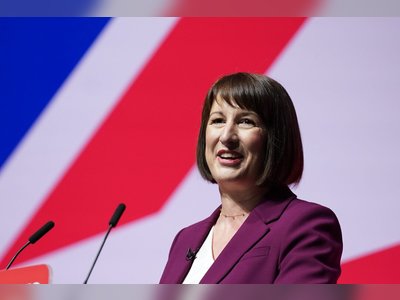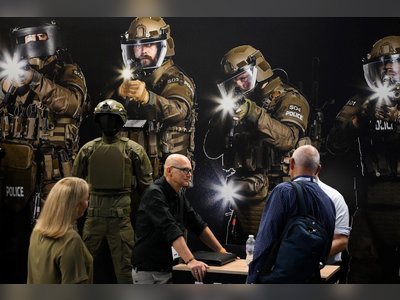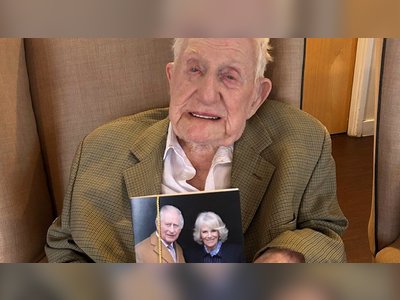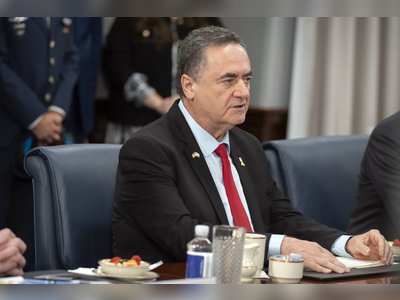U.S. Supreme Court Rejects Trump's Bid to Delay Sentencing in Hush Money Case
Historic decision paves the way for the former president's sentencing just days before taking office.
In a landmark decision, the United States Supreme Court has denied former President Donald Trump's urgent request to postpone his sentencing in his widely publicized hush money case.
This development marks a significant moment in U.S. history, as Trump is set to become the first former president to be convicted of a crime and the first to assume office as a convicted criminal.
By a narrow five-to-four vote, the Supreme Court opted not to intervene, upholding the decisions of three New York courts that similarly rejected Trump's appeals.
This verdict ensures that the sentencing hearing will proceed as scheduled on Friday, a mere ten days before Trump's inauguration on January 20.
The case revolves around Trump's attempts to suppress allegations of a pre-election payment of $130,000 (£105,300) to pornographic film actress Stormy Daniels in 2016.
This payment was purportedly made to prevent disclosures about an alleged affair, which Trump has consistently denied.
Despite pleading not guilty, Trump was found guilty on 34 felony counts related to these payments in a New York court.
Trump and his legal team have consistently characterized the proceedings as politically motivated, alleging it is a 'witch hunt' designed to undermine his political career.
His representatives attempted to argue that the continuation of legal proceedings would hinder the federal government's operations, especially with Trump's imminent inauguration.
In spite of Trump's efforts to dismiss the charges citing his recent election victory, the Supreme Court's decision underscores the judiciary's role in maintaining the integrity of legal processes irrespective of political implications.
Judge Juan M.
Merchan, presiding over the case, has indicated that Trump will neither receive jail time nor be subjected to fines or probation.
Nonetheless, Trump's attorneys have argued that the distraction of the legal proceedings is untenable with the inauguration looming just over a week away.
They also contended that the evidence leveraged in the Manhattan trial violated a previous Supreme Court ruling extending significant immunity to former presidents for acts conducted during their tenure.
Prosecutors have counter-argued, deeming Trump's request for the Supreme Court's intervention as unnecessary, emphasizing that the legal team has failed to demonstrate how a virtual hearing of merely an hour would materially disrupt proceedings.
They further warned that acceding to Trump's request could postpone sentencing indefinitely, potentially delaying justice for years.
Reactions to the Supreme Court's refusal have been polarized.
On Truth Social, Trump's social media platform, he vehemently denounced the charges as fabricated and condemned the legal actions as a misuse of judicial power against him.
"This is a case that should never have been brought," Trump remarked in a statement, underscoring his conviction in his innocence and expressing confidence that "JUSTICE WILL PREVAIL." Despite Trump's vocal criticisms, the judicial process is poised to continue, marking a new chapter in the turbulent saga of Trump's legal and political journey.
The repercussions of the case and the Supreme Court's decision reverberate beyond national borders, given the geopolitical interest surrounding Trump's policies and legacy.
As a global figure, the scrutiny of Trump's legal entanglement draws significant international attention, highlighting broader themes of justice, accountability, and governance.
This development marks a significant moment in U.S. history, as Trump is set to become the first former president to be convicted of a crime and the first to assume office as a convicted criminal.
By a narrow five-to-four vote, the Supreme Court opted not to intervene, upholding the decisions of three New York courts that similarly rejected Trump's appeals.
This verdict ensures that the sentencing hearing will proceed as scheduled on Friday, a mere ten days before Trump's inauguration on January 20.
The case revolves around Trump's attempts to suppress allegations of a pre-election payment of $130,000 (£105,300) to pornographic film actress Stormy Daniels in 2016.
This payment was purportedly made to prevent disclosures about an alleged affair, which Trump has consistently denied.
Despite pleading not guilty, Trump was found guilty on 34 felony counts related to these payments in a New York court.
Trump and his legal team have consistently characterized the proceedings as politically motivated, alleging it is a 'witch hunt' designed to undermine his political career.
His representatives attempted to argue that the continuation of legal proceedings would hinder the federal government's operations, especially with Trump's imminent inauguration.
In spite of Trump's efforts to dismiss the charges citing his recent election victory, the Supreme Court's decision underscores the judiciary's role in maintaining the integrity of legal processes irrespective of political implications.
Judge Juan M.
Merchan, presiding over the case, has indicated that Trump will neither receive jail time nor be subjected to fines or probation.
Nonetheless, Trump's attorneys have argued that the distraction of the legal proceedings is untenable with the inauguration looming just over a week away.
They also contended that the evidence leveraged in the Manhattan trial violated a previous Supreme Court ruling extending significant immunity to former presidents for acts conducted during their tenure.
Prosecutors have counter-argued, deeming Trump's request for the Supreme Court's intervention as unnecessary, emphasizing that the legal team has failed to demonstrate how a virtual hearing of merely an hour would materially disrupt proceedings.
They further warned that acceding to Trump's request could postpone sentencing indefinitely, potentially delaying justice for years.
Reactions to the Supreme Court's refusal have been polarized.
On Truth Social, Trump's social media platform, he vehemently denounced the charges as fabricated and condemned the legal actions as a misuse of judicial power against him.
"This is a case that should never have been brought," Trump remarked in a statement, underscoring his conviction in his innocence and expressing confidence that "JUSTICE WILL PREVAIL." Despite Trump's vocal criticisms, the judicial process is poised to continue, marking a new chapter in the turbulent saga of Trump's legal and political journey.
The repercussions of the case and the Supreme Court's decision reverberate beyond national borders, given the geopolitical interest surrounding Trump's policies and legacy.
As a global figure, the scrutiny of Trump's legal entanglement draws significant international attention, highlighting broader themes of justice, accountability, and governance.










